memoirs
Notes for the Everlost: A Field Guide To Grief by Kate Inglis
Part memoir, part handbook for the heartbroken, this powerful, unsparing account of loss will speak to all who have been bereaved and are grieving, and offers inspiration on moving forward, gently integrating the loss into life.
When Kate Inglis’s twin boys were born prematurely, one survived and the other did not. Inglis's story is a springboard that can help other bereaved parents—and anyone who has experienced wrenching loss—reflect on emotional survival in the first year; dealing with family, friends, and bystanders post-loss; the unique guilt and isolation of bereavement; and the fortitude of like-minded community and small kindnesses.
Inglis's unique voice—at once brash, irreverent, and achingly beautiful—creates a nuanced picture of the landscape of grief, encompassing trauma, waves of disbelief and emptiness, moments of unexpected affinity and lightness, and the compassion that grows from our most intense chapters of the human experience.
“Notes for the Everlost is the most beautifully written book I have read in ages, and a great deal more besides: comforting, and sad; full of riddles and wisdom; an unsparing map of grief, with its stubborn terrain and dark jokes and switchback heartbroken roads. This book is great company for terrible times.” —Elizabeth McCracken, author of Thunderstruck & Other Stories
To Linger on Hot Coals by Stephanie Paige Cole and Catherine Bayly
This is a collection of poems from grieving mothers edited by Stephanie Paige Cole, of the Sweet Pea Project, and Catherine Bayly. This book is a beautiful, painful, and honest collection of babylost poetry, which includes poems by both of the editors as well as a dozen other writers, and a forward by Dr. Joanne Cacciatore. Their website says, "Within the pages you’ll find cerebral iterations of the infinite ripple effects of grief and the raw visceral howls of grief’s earliest days."
Ghostbelly by Elizabeth Heineman
Bucking Americans’ typical cultural aversion to death and the dead body, Lisa brought her stillborn son Thor’s body home. She shows him around the house. Takes him for walks. Talks to him. Creates memories. This is the story in the new memoir of stillbirth and loss by author Elizabeth Heineman.
Ghostbelly pulls the reader in immediately. Elizabeth—who goes by Lisa—is a feminist and an academic, which is apparent through her analysis to the broader themes she tackles surrounding Thor’s birth and death—home birth, advanced maternal age, relationships, parenting a living child, medical care and birthing culture in America. But her writing isn’t exclusively academic. She narrates the story of Thor’s life and his death in beautiful and poetic passages. And she delves deep, with a painful honesty, into those questions we that we babylost parents ask ourselves—who do we blame for the loss of our child? How do we grieve? What do we do now that our child is gone?
Knocked Up, Knocked Down: Postcards of Miscarriage and Other Misadventures from the Brink of Parenthood by Monica Murphy LeMoine
Monica Murphy LeMoine is used to writing postcards from strange, faraway places. After years of traveling around the world with her Peace Corps sweetheart-turned-husband, she finds herself on a blissfully ignorant journey toward new parenthood.
When the pregnancy ends before it's supposed to, Monica is abruptly launched into a different kind of world that nothing in life has prepared her for. It is up to Monica to navigate this strange land of almost-parenthood, make sense of her own confusing grief for real and imagined lives lost, and-ultimately-learn to move forward without someone she loves. A memoir told in postcards, Knocked up, Knocked Down is about finding solace in the most surprising places when life knocks you to the ground.
Shadow Child: An Apprenticeship in Love and Loss by Beth Powning
In this perceptive, profoundly moving meditation on love and loss—and the often poignant connection between the two—Beth Powning shares the lessons that time and nature have taught her. Like many young women with career ambitions in the redefining 1960s, Beth Powning struggles with the decision as to whether, and when, she should start a family, although eventually her ambivalence about motherhood yields to a dream of a baby. At the age of twenty-four she becomes pregnant, and her dream becomes reality. Then, late into a cold February night, eleven days past her due date, under induced labor, Beth delivers a stillborn son.
Several years later, to overwhelming joy, Beth gives birth to Jacob, but the growth of her second son is soon shadowed by that of Beth's other, first child, who has emerged from the darkness of memory. So it is that she begins to come to terms with the conditions of life that hone and humble each of us-with birth and death, with joy and pain, with losses and love and the relentless passage of time-in this beautifully wrought exploration of selfhood, womanhood, and motherhood.
Life Touches Life: A Mother's Story of Stillbirth and Healing by Lorraine Ash
In spite of the fact that 1 in every 115 deliveries is a stillborn baby, stillbirth continues to be a taboo subject. In Life Touches Life, Lorraine Ash describes how she met that silence head-on. After a trouble-free pregnancy, her baby was declared dead on what was to be her date of birth.
Following a C-section, Ash fought a fever that raged at 104 degrees and almost succumbed to the silent B-strep infection that had killed her daughter. Devastated by the experience, Ash sought solace and perspective in all the old places and found little relief. In this moving account she discusses the inner changes she faced after the stillbirth of her daughter, delves into spiritual questions that shook her soul, and examines the connection between mother and child that transcends separation and death.
They Were Still Born: Personal Stories About Stillbirth edited by Janel C. Atlas
In 2006, Janel Atlas became one of those mothers who left the hospital with empty arms; her second daughter, Beatrice Dianne, was stillborn at 36 weeks. Reaching out for comfort, she realized a dire need shared by so many others like her, and so was born a collection of new essays by writers each sharing their firsthand experiences with stillbirth.
Atlas includes selections not only from mothers but also fathers and grandparents, all of whom have intimate stories to share with readers. In addition, there are selections that answer many of the medical questions families have in the wake of a stillbirth and that offer the latest research on this devastating loss and how it might be prevented. Grieving parents will find in these pages the comfort of knowing they are not alone on this painful path, validation of their babies' lives, and guidance from those who have suffered this tragedy. In addition, They Were Still Born both inspires and shows readers how to honor and remember their own babies and stories of loss.

This Lovely Life by Vicki Forman
Vicki Forman gave birth to Evan and Ellie, weighing just a pound at birth, at twenty-three weeks’ gestation. During the delivery she begged the doctors to "let her babies go" — she knew all too well that at twenty-three weeks they could very well die and, if they survived, they would face a high risk of permanent disabilities. However, California law demanded resuscitation. Her daughter died just four days later; her son survived and was indeed multiply disabled: blind, nonverbal, and dependent on a feeding tube.
This Lovely Life tells, with brilliant intensity, of what became of the Forman family after the birth of the twins — the harrowing medical interventions and ethical considerations involving the sanctity of life and death. In the end, the longdelayed first steps of a five-year-old child will seem like the fist-pumping stuff of a triumph narrative. Forman’s intelligent voice gives a sensitive, nuanced rendering of her guilt, her anger, and her eventual acceptance in this portrait of a mother’s fierce love for her children.
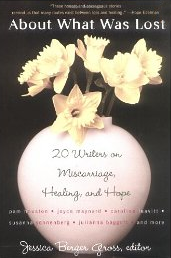
About What Was Lost: Twenty Writers on Miscarriage, Healing, and Hope edited by Jessica Berger Gross
In this intimate anthology, twenty writers explore the grief and sadness—and hope—that living through a miscarriage can bring. Featuring such notable writers as Pam Houston, Joyce Maynard, Caroline Leavitt, Susanna Sonnenberg, and Julianna Baggott, among many others, About What Was Lost is the only book that uses honest, eloquent narrative and a wide spectrum of experiences and perspectives to provide solace and support on the subject of pregnancy loss.

An Exact Replica of a Figment of My Imagination by Elizabeth McCracken
"This is the happiest story in the world with the saddest ending." A prize-winning, successful novelist in her 30s, McCracken was happy to be an itinerant writer and self-proclaimed spinster. Then she fell in love, got married, and continued her life of writing, traveling, and teaching with her husband. Two years ago, she found herself in a remote part of France, waiting for the birth of her first child.
This book is about what happens next. In her ninth month of pregnancy, a baby is lost. Just over a year later, a baby is born. In a profoundly moving display of humor, heart, and unfailing generosity, McCracken tenderly presents her story.

The Blue Poppy and the Mustard Seed: A Mother's Story of Loss and Hope by Kathleen Willis Morton
Katie Morton's son Liam was born with profound brain damage. When he died six-and-a-half weeks later, she searched for answers in books on grief and coping, but none seemed to address her situation. Without completely understanding why, Morton embarked on a wider search for solace.
The Blue Poppy and the Mustard Seed takes readers along as she travels to foreign lands to illuminate her inner journey through emotional highs and lows. She interweaves what she witnesses — rituals like children's baths and picnics, and rites of passage like birth and death — with her own progress. She discovers that the pain she has experienced is both unavoidable and necessary, a pivotal part of the process of healing that can lead to "a victorious kind of joy, of acceptance." In discovering herself, Morton shows readers suffering from similar tragedies how to endure world-shattering pain and come out whole.
advice & support
How to Survive a Miscarriage: a guide for women, their partners, friends and families by Karin Holmes
Suffering a loss through miscarriage is a devastating and life-altering experience. The pain and heartbreak felt by these families often goes unnoticed. Author Karin Holmes recognized the need to provide a voice for those encountering such sadness, knowing that it is much more than "something" one can simply “get over”. This book contains strategies for coping with sadness and guilt, suggestions for rituals, advice on getting through subsequent pregnancies, rediscovering oneself as well as advice to partners and families so they may provide the much needed support when it is needed the most.
Pregnancy Loss: Surviving Miscarriage and Stillbirth by Zoe Taylor
When a pregnancy fails, grieving parents often wonder why no one mentioned it could happen. Yet one in every four women will experience miscarriage or stillbirth. Mother of two and health writer Zoe Taylor has survived repeated pregnancy losses. In this book, she shines a light on the experience of pregnancy loss and the desire for answers; what experts know about causes and risk factors, and new areas of research; strategies for facing a world that poorly understands pregnancy loss; trying again; pregnancy after a loss; deciding to stop trying; and tips on how to support people going through pregnancy loss. Pregnancy Loss: Surviving Miscarriage and Stillbirth is a book of courage, hope and survival. It will help all people touched by loss, including parents, partners, friends, family, researchers, doctors and caregivers.
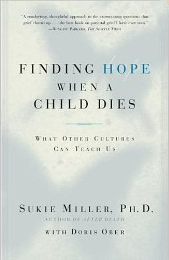
Finding Hope When a Child Dies: What Other Cultures Can Teach Us by Sukie Miller
The death of a child is an overwhelming loss. "Why did my child die?" and "Is my child suffering now?" are questions that all people, of all cultures and backgrounds, ask. But characteristic of Western culture is a limited language for expressing grief, and a consuming guilt that undermines the recovery process.
Dr. Sukie Miller, author of the landmark work After Death, turns to the beliefs and healing stories of other cultures to present a unique perspective that is both surprising and comforting. Sharing her research with a compassionate and grounded voice, she offers hope to those seeking meaning in what seems senseless, and heartening possibilities for returning to wholeness, even if we feel life cannot ever be the same.
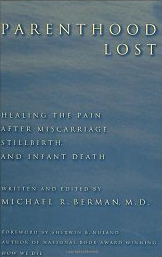
Parenthood Lost: Healing the Pain after Miscarriage, Stillbirth, and Infant Death by Michael R. Berman
Losing a pregnancy or newborn is a grievous experience. In Parenthood Lost, Dr. Michael Berman shares his insights from his experiences helping parents deal with their grief and unravels the confusing genetic and medical causes of miscarriage, stillbirth, and infant death. Through original poetry, firsthand stories told by parents, and articles describing genetic and medical disorders, Parenthood Lost offers clarification and hope for parents who have suffered this tragedy.
Dr. Berman [an OB/GYN professor from Yale University School of Medicine] includes a section on the most common reasons for perinatal losses, with detailed medical information written by practicing obstetricians, and a helpful glossary of terms.
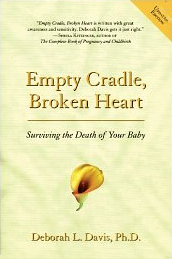
Empty Cradle, Broken Heart: Surviving the Death of Your Baby ~ Deborah L. Davis
The heartache of miscarriage, stillbirth, or infant death affects thousands of U.S. families every year. Empty Cradle, Broken Heart offers reassurance to parents who struggle with anger, guilt, and despair after such tragedy.
Deborah Davis encourages grieving and makes suggestions for coping. The book includes information on issues such as the death of one or more babies from a multiple birth, pregnancy interruption, and the questioning of aggressive medical intervention. There is also a special chapter for fathers as well as a chapter on "protective parenting" to help anxious parents enjoy their precious living children. Doctors, nurses, relatives, friends, and other support persons can gain special insight.

I Never Held You: Miscarriage, Grief, Healing and Recovery by Ellen M. DuBois
I Never Held You speaks to the heart of women, their families and friends who have either lived through the pain & grief after miscarriage, or who want to better support someone who has. Author Ellen M. DuBois shares her own painful journey after miscarriage taking you from her darkest moments of grief, despair, isolation, anxiety, fear and depression to the steps she took towards healing and recovery. Her suggestions prove to be helpful in balancing the emotional peaks and valleys after suffering such a heartbreaking loss. I Never Held You validates your grief after losing a baby to miscarriage, and assures you that you're not alone in your struggle. With the help of contributing author Dr. Linda Backman, Ed.D., licensed grief counselor, psychologist and author, you'll come to better understand grief- and why it's so important to allow yourself the time necessary to heal.

A Silent Sorrow: Pregnancy Loss - Guidance and Support for You and Your Family by Ingrid Kohn, Isabelle A. Wilkins, Perry-Lynn Moffitt
A Silent Sorrow has long been considered the "bible" for families seeking emotional and practical support after a pregnancy loss. Revised and updated with recent findings in medical procedures, laws governing pregnancy termination, and the issues surrounding pregnancy loss and reproductive technologies, this straightforward yet sympathetic guide reaches out to couples who have experienced loss and helps them to understand and move through the mourning process.
The authors address the issues of why and how men and women grieve differently; the potential impact of pregnancy loss on one's career; how to cope with ending an impaired pregnancy; the dual burden of pregnancy loss and infertility, and how to handle pregnancies that occur after such a loss. A Silent Sorrow draws from interviews with bereaved parents to illustrate coping strategies that have proven effective in such difficult situtations. Well organized, easily accessible, and filled with practical suggestions for each topic it covers, A Silent Sorrow is a positive first step for bereaved parents and their families, providing support and guidance to help resolve the grief and enable them to look to the future with hope.
grief & healing
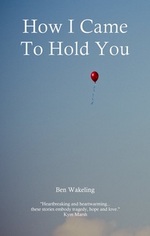
How I Came to Hold You by Ben Wakeling
How I Came to Hold You is a compilation of stories about people who have walked the lonely road of babyloss and trying again for another baby. They are the stories of loss that are so familiar to those of us who find ourselves at Glow in the Woods. But they are also stories of love and how it was to cope with such profound grief through subsequent pregnancies.
Every day in the UK, 17 babies are stillborn or die shortly after birth. Behind each baby is a family rocked to its foundations by their loss. How I Came to Hold You tells the real-life stories of 17 families who have suffered the tragedy of losing a child and experienced the challenges and emotions faced upon discovering they are expecting again.
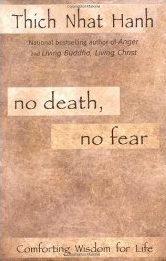
No Death, No Fear: Comforting Wisdom for Life by Thich Nhat Hanh
In a book both timely and timeless, beloved Buddhist teacher and poet Thich Nhat Hanh tackles a subject that has been contemplated by Buddhist monks and nuns for twenty-five hundred years-and an eternal mystery that touches us all: What is death? Through Zen parables, guided meditations, and personal stories, he explodes the traditional myths of how we live and die. Even more, Thich Nhat Hanh shows us a way to live a life unfettered by fear.
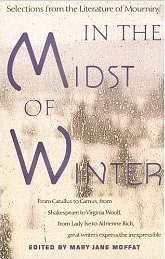
In the Midst of Winter: Selections from the Literature of Mourning edited by Mary Jane Moffat
Death silences not only those it takes, but those it leaves behind: All too typically we can neither express our grief nor express sympathy for the bereaved. In his sensitive collection, toss finds a voice—or several voices—in the poetry, fiction, letters, and diaries of the world's great writers.
Here are James Agee, recording the shock of his father's death; William Shakespeare, making poetry of Cleopatra's grief; the Biblical wisdom of The Book of Lamentations; the psychological acuity of Marcel Proust. Here are mourners from classical Rome to eleventh-century China, from the Paiute Indians to present-day Ireland. Arranged in sections that correspond to the stages of mourning, In the Midst of Winter is a collection whose breadth and resonance make it invaluable and utterly unique.

When Things Fall Apart: Heart Advice for Difficult Times by Pema Chodron
The beautiful practicality of her teaching has made Pema Chödrön one of the most beloved of contemporary American spiritual authors among Buddhists and non-Buddhists alike. A collection of talks she gave between 1987 and 1994, the book is a treasury of wisdom for going on living when we are overcome by difficulties. Chödrön discusses how painful emotions can cultivate wisdom, compassion, and courage; how to encourage others to open up rather than shut down; and how to reverse habitual patterns and work with chaotic situations.
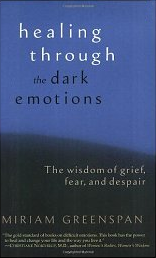
Healing Through the Dark Emotions: The Wisdom of Grief, Fear and Despair by Miriam Greenspan
We are all touched at some point by the dark emotions of grief, fear, or despair. In an age of global threat, these emotions have become widespread and overwhelming. While conventional wisdom warns us of the harmful effects of "negative" emotions, this revolutionary book offers a more hopeful view: there is a redemptive power in our worst feelings.
Seasoned psychotherapist Miriam Greenspan argues that it's the avoidance and denial of the dark emotions that results in the escalating psychological disorders of our time: depression, anxiety, addiction, psychic numbing, and irrational violence. And she shows us how to trust the wisdom of the dark emotions to guide, heal, and transform our lives and our world. Drawing on inspiring stories from her psychotherapy practice and personal life, and including a complete set of emotional exercises, Greenspan teaches the art of emotional alchemy by which grief turns to gratitude, fear opens the door to joy, and despair becomes the ground of a more resilient faith in life.
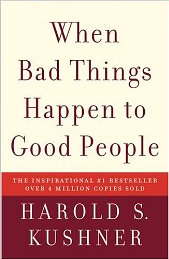
When Bad Things Happen to Good People by Harold S. Kushner
When Harold Kushner’s three-year-old son was diagnosed with a degenerative disease and that he would only live until his early teens, he was faced with one of life’s most difficult questions: Why, God? Years later, Rabbi Kushner wrote this straightforward, elegant contemplation of the doubts and fears that arise when tragedy strikes. Kushner shares his wisdom as a rabbi, a parent, a reader, and a human being. Often imitated but never superseded, When Bad Things Happen to Good People is a classic that offers clear thinking and consolation in times of sorrow.

Transcending Loss: Understanding the Lifelong Impact of Grief and How to Make it Meaningful by Ashley Davis Prend
"There are many wonderful grief books available that address acute grief and how to cope with it. But these books often focus on crisis management and imply that there is an 'end' to mourning. They essentially fail to address the issue of grief's ongoing impact, and how it changes through the years..."
"This is a book about death and grief, yes, but more importantly it is a book about love and hope. I have learned from [my interviews with] courageous people about pain, struggle, resiliency, and meaning. Their stories show that over time, you can learn to transcend even in spite of pain. We all get broken by life sooner or later because loss is the price we pay for living and loving. But experience shows that we can become stronger at the broken places and find the opportunity in crisis. I hope this book will help you move beyond grief and will guide you on your journey through time of healing and transcendence." (from the introduction)
for siblings

Sam and Finn by Kate Polley
Sam and Finn is the story of twin boys, one who lives, and one who dies. Through rhyming verse, Sam, the "boy with wings," reassures his twin that although he is not physically present, he can be found in all the things of the world—the breeze, the stars, the sand—and reflected in his brother—his dimple and "grubby feet."
The Heart and the Bottle by Oliver Jeffers
Award-winning picture book star Oliver Jeffers explores themes of love and loss in this life-affirming and uplifting tale. In this deeply moving story, Jeffers deals with the weighty themes of love and loss with an extraordinary lightness of touch and shows us, ultimately, that there is always hope.
Once there was a girl whose life was filled with wonder at the world around her… Then one day something happened that made the girl take her heart and put it in a safe place. However, after that it seemed that the world was emptier than before. But would she know how to get her heart back?

Gentle Willow: A Story for Children About Dying by Joyce C. Mills
Written for children who may not survive their illness or for the children who know them, this tender and touching tale helps address feelings of disbelief, anger, and sadness, along with love and compassion. Amanda and Little Tree discover that their friend Gentle Willow isn't feeling well. Amanda summons the Tree Wizards, who visit Gentle Willow and determine that they can't fix her.
Amanda is angry at first, but eventually she listens to the Tree Wizards as they explain that death is a transformation and journey into the unknown. They also counsel Amanda that the medicine she can give Gentle Willow is love. In a final act of love, Amanda comforts Gentle Willow, who is afraid, with a story about the caterpillar who transforms into a butterfly.
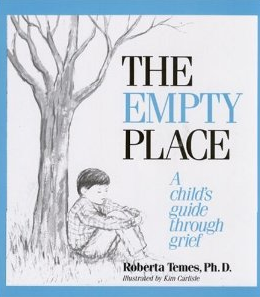
The Empty Place : A Child's Guide Through Grief by Roberta Temes
A boy describes the feelings of loss, fear, and guilt felt by himself and his friend Betsy after each of them experiences the death of a sibling. Illustrations by Kim Carlisle.
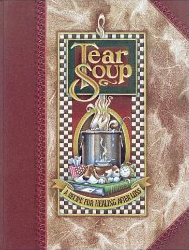
Tear Soup by Pat Schwiebert
Tear Soup is a family story book that centers around an old and wise woman, Grandy. Grandy has just suffered a loss in her life and so she is headed to the kitchen to make a special batch of Tear Soup. There she chooses the size pot that is right for her loss, and she puts on her apron because she knows it's going to be messy. And then Grandy starts to cry. At first she weeps, then she sobs, eventually she wails. Slowly the pot is filled with tears as the old woman steeps away. To season her soup Grandy adds memories like the good times and the bad times, the silly and the sad times. Tear Soup recognizes and reinforces the fact that every member of the family from the youngest to the oldest will grieve in their own way.

Water Bugs & Dragonflies: Explaining Death to Young Children by Doris Stickney
How can we answer the many questions young children have about death? Looking for a meaningful way to explain the death of a five-year-old friend to neighborhood children, Stickney adapted a graceful fable about a water bug that changed into a dragonfly.

Children Also Grieve: Talking About Death And Healing by Linda Goldman
Children Also Grieve tells of the experiences of Henry, the dog of a family whose grandfather has died. During Henry's progress through the different stages of bereavement, he learns strategies for coping with his grief.
Goldman provides readers with the opportunity to share their own reactions to loss through words and pictures, using specific prompt questions that explore different facets of grief. The second part includes a list of useful vocabulary, to help children express their feelings about bereavement, a bibliography of other useful resources for both children and adults, and a section that will help adults to understand and aid children throughout the grief process. This last section also explains the approach taken in the story, details typical responses to bereavement, and discusses useful ways in which adults can discuss and share grief with children.

No New Baby : For Siblings Who Have a Brother or Sister Die Before Birth by Marilyn Gryte
This storybook talks about the different feelings children have and answers some of the most asked questions. Recently revised, includes a section for parents and grandparents.

Something Happened: A Book for Children and Parents Who Have Experienced Pregnancy Loss by Cathy Blanford
This beautifully illustrated, simple, clear story is designed to help a young child understand what has happened when there has been a pregnancy loss. The book addresses the sadness that a child experiences when the anticipated baby has died. Children who have experienced a death in their family are very reassured by stories of others who have had a similar experience. It helps them to understand better what has happened in their own family while at the same time offering the comforting knowledge that they are not alone in their feelings.

When Dinosaurs Die: A Guide to Understanding Death by Laurie Krasny Brown and Marc Brown
Explains in simple language the feelings people may have regarding the death of a loved one and the ways to honor the memory of someone who has died.

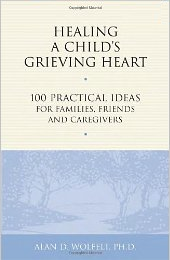
With sensitivity and insight, this series offers suggestions for healing activities that can help survivors learn to express their grief and mourn naturally.
Acknowledging that death is a painful, ongoing part of life, they explain how people need to slow down, turn inward, embrace their feelings of loss, and seek and accept support when a loved one dies.
Each book, geared for mourning adults, teens, or children, provides ideas and action-oriented tips that teach the basic principles of grief and healing. These ideas and activities are aimed at reducing the confusion, anxiety, and huge personal void so that the living can begin their lives again. Included in the books for teens and kids are age-appropriate activities that teach younger people that their thoughts are not only normal but necessary.
for trying again

Pregnancy After a Loss: A Guide to Pregnancy After a Miscarriage, Stillbirth, or Infant Death by Carol Cirulli Lanham
For a woman who has experienced a miscarriage, stillbirth, or the death of an infant, conceiving another child can be fraught with mixed emotions. This guide, filled with up-to-date medical information and written by a woman who herself experienced a successful pregnancy after the loss of her first baby, can help women cope with their anxiety. It offers guidance for women asking such questions as:
Why did it happen—and how can I make sure it doesn't happen again? Will my next pregnancy be considered high-risk? How long should I wait before getting pregnant again? What can I expect at prenatal exams? Will I ever be able to love another baby as much as I love the one I lost?
Pregnancy after a loss can be a time of great emotional upheaval--but also, a time of healing and hope. With this sensible, sensitive guide, women can put their minds at ease, and learn to look forward to the future as they make peace with the past.

Trying Again: A Guide to Pregnancy After Miscarriage, Stillbirth, and Infant Loss by Ann Douglas
Written especially for parents who have lost a child, Trying Again provides facts to help determine whether you, or your partner, are emotionally ready for another pregnancy.
We'd love to hear more of your reading recommendations. Please share them—and your thoughts on the books above—in the comments below.
With love —the editors











